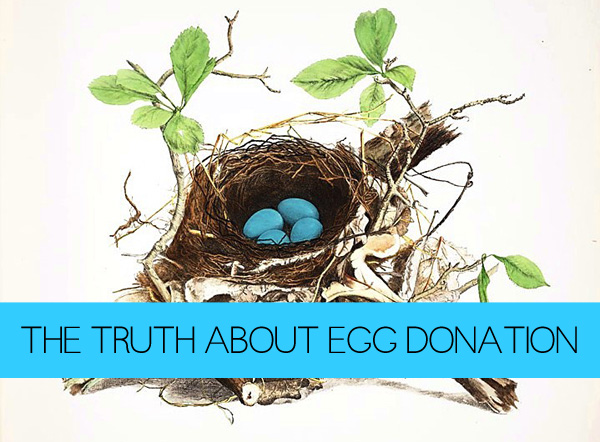I donated eggs — to gay men, through an agency, in exchange for money — twice in my twenties. At one point, I was in the Washington Post about it. As a result of going public, I’ve gotten a good number of questions about it, and more requests than I can count from young women writing for their school newspapers.
The basics: The way egg donation is run, the parents who received my eggs have seen photos (and even a video interview) of me, whereas all I ever learned about them was first name and state of residence.
At one point I was told that one of my donations had been successful.
Intended parents who receive the eggs can basically use them at will, so it’s possible that someone used my eggs to have twins and then kept some more embryos in the freezer for later (embryos freeze a lot better than unfertilized eggs). So my egg donations have produced at least one child, and possibly quite a few more.
In 2007, I was on a panel about egg donation, along with doctors and psychologists. A psychologist remarked that egg donors are so giving and would never do something like that for the money.
Of course there are no such expectations of sperm donors.
I retorted that saying that financially struggling young women donate eggs out of the goodness of their hearts is like saying that poor men work in coal mines because they are so concerned that the rich have enough electricity.
Obviously, I was making a sarcastic comment, but egg donation and coal mining do have a few things in common in that they involve some physical danger, and they’re both forms of income generation that are not even considered by people who are born wealthy. When my grandmother died of ovarian cancer, it did not escape me that holy shit, I hyperstimulated my ovaries with hormones ON PURPOSE.
Egg donation is dangerous, folks. Or at least, it very well could be, and there isn’t a lot of financial motivation on anyone’s part to find out.
Of course, some egg donors, and some sperm donors, are indeed motivated primarily by altruism. In fact, the panel on which I was sarcastic (that actually could refer to a lot of events in my life) also featured another egg donor who had donated three times, at least one of which she had not been paid for, because she was a really nice and earnest person who loved babies and wanted others to love them too.
But when agencies advertise for egg donors, the ads never say, “Do you have a big heart?” They usually have a picture of a blonde model and say something about making $10,000.
Here’s a question.
Good afternoon, I am [name redacted] and I was actually referred to you by a person on Reddit. I recently asked a question about being an egg donor and seeing as you have been one I was wondering what the pro’s and con’s were to it. If there was anything they are not telling me in the ads? Your response would be greatly appreciated. Thank you.
Ah, interesting! What don’t they tell you in the ads?
Allow me.
First, the meds. Lupron is only approved by the FDA for men with terminal prostate cancer, and for endometriosis. So one of the major drugs you’re taking is being used for a REALLY off-label purpose. That said, Lupron actually went really well — creepily well — for me. It sort of sucked all the estrogen out of my body and made me feel really calm, cool, and confident. Like a real bro. Having that feeling just once kind of recalibrated me. Kind of like the expression about how a fish doesn’t notice it’s wet, NOT having lady-hormones made me fully cognizant of the effects of lady-hormones. That said, I suppose it could have gone really wrong.
If something goes wrong, the health insurance policy they purchase “for you” won’t cover the ongoing effects (see TIME). It’s a really limited policy that covers problems occurring during a timeframe that basically ends when the agency/intended parents get what they want. Long-lasting effects from egg donation are an unlikely occurrence, but I’d make sure you have your own insurance policy in place so you’re not depending on the agency once the agency is done with you.
There are lots of blogs written by people who are the product of egg and sperm donation (mostly sperm donation, which has been around a lot longer). Some of them are VERY ANGRY. They use language like, “How could my father sell me?” They make the excellent point that, if having a biological child was so important for the parent who used a donor, then why wouldn’t knowing their biological parents be important for the children? You should read these blogs — just do some googling — before deciding. If you’re out to do a good deed, know that you may be producing a kid who is angry that her “mother” considered her a financial transaction. Of course, plenty of children created the old-fashioned way at some point shout at their parents, “I never asked to be born!” No one has children because they expect a constant stream of gratitude.
When I was donating, I was a flippant twentysomething. When asked by the psychologist if I would have a problem with my DNA being “out there,” I said something cute like, “I have great genes, so if people are going to have kids anyway, they should definitely use my DNA.” For some reason, I had been imagining that the child produced from egg donation would be a boy. Then, a few years later, I walked past a children’s clothing store and saw a sign or a little dress or something and realized it could be a little girl who looks like me, and that made me kind of upset. But also, if there is a little girl who looks like me, she wouldn’t have existed at all if I hadn’t donated, so… I’m saying it’s complicated. Your feelings may change over time.
At the time, I actually felt a sense of relief and completion from egg donation, knowing that if I got hit by a truck tomorrow, at least I got my genes out there. Some primitive part of my brain was like, OUR JOB HERE IS DONE.
The second time I donated eggs, I was in a relationship. My boyfriend was pretty involved in his career and didn’t have much to say about the egg donation process. When we broke up like two YEARS later, it came out: “I can’t believe you had a baby with someone who wasn’t me.” That was some primal shit.
Once, after I had removed my profile from the egg donation site (I was doing better in my career and had enough money that risking my health for cash seemed reckless), I was contacted by the agency, saying that the parents of a child I had contributed to wanted a sibling and wanted to know if I would donate again. I responded by asking for baby pictures. They disappeared. That kind of hurt my feelings, you know? They want my freaking eggs, but I can’t see a picture of their kid? It’s kind of like making the help use the outhouse out back.
After I donated eggs, I worked for awhile for the egg donation agency, largely facilitating meetings that took place by speakerphone — the agency in LA would schedule a meeting in New York, and I would set up the conference room in New York, greet the surrogate mother and her husband and the intended parents (mostly gay men), and smile pleasantly while the agency lady led the meeting over speakerphone. The donors were never present for these meetings, but one of the standard questions asked in these meetings was how the intended parents had chosen their egg donor. Once, it was, “She looked like my grandmother.” Once, it was, “She likes the same TV shows we like.” But a lot of the intended parents would just kind of shrug: We needed some eggs because we don’t have any. We got eggs. Everyone on the egg donor site is healthy and good-looking, so some intended parents just pick a hair color and go for it. In other words, very few intended parents are really thinking about you all that much. That could be good or bad depending on your perspective.
Some of the people who are looking for eggs are also assholes. (And some of them are very nice and just want a baby to love!) But some of them post things online like, “How can these snotty young girls charge us so much money when they have eggs and we’re suffering from infertility? WE’RE THE VICTIMS HERE.” I find it positively gross that someone would think they have the right to someone else’s body parts. I mean, sometimes you need a kidney to survive. But even then, you don’t have the RIGHT to someone else’s. And nobody needs eggs to survive. Basically, I’m making the point that you don’t know who’s getting the eggs, and you don’t know how that person regards you — maybe as an angel, maybe as a mercenary, maybe as nothing at all.
On the flipside, I was really, really broke the first time I donated eggs, and I remember immediately returning from Los Angeles to New York and solving a dozen life problems for $50-100 apiece. Professional stuff (domain names, business cards), labor-saving household devices, a dental checkup.
I have written a number of articles about how to think about money — and John Cheese has written many, many articles about how not to — and I reiterate the point that 90% of problems can be solved with money, which leaves you a lot more time and energy to worry about the remaining 10% of existential problems that can’t be solved with money.
Also, not everyone has the same problems. Some people’s problems can be completely solved with money. I wonder how many struggling smart people could turn their lives around with $8,000 all at the same time.
Additional recommended reading:
Should Egg Donors Be Paid? – 2010 NYTimes article in which I sounded off in the comments
Lisa Belkin’s An Egg Donor Responds
Good luck with whatever you decide!









